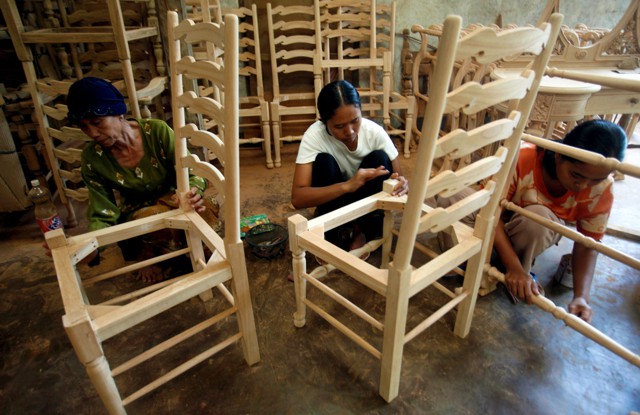Women have worked with wood for centuries in Jepara, the capital of Indonesia’s thriving carved teak and mahogany furniture industry. Unfortunately, recently the trees and the women whose lives depend on them have not gotten a very good deal.
After decades of over-exploitation, Indonesia’s stocks of teak and mahogany are dwindling. If Indonesia is not careful, soon there could be no trees left to carve.
Located on Java’s north coast, Jepara’s port has exported furniture for hundreds of years. Even in colonial times its products were world famous. In the 19th century Raden Adjeng Kartini, an icon of Indonesian feminism, lived here and promoted Jepara’s products to Europeans with whom she corresponded. The work was considered ‘Godly’. High standards of craftsmanship were expected.
The area was once led by powerful female rulers, Queen Shima and Queen Kalinyamat. Presumably even then, intricately carved tables, chairs and cupboards were leaving Jepara’s harbor in sailing ships.
The women who work in Jepara today are not seeing much of the profits. They still represent around half the workforce, but are typically paid just $1.50 a day – half as much as their male counterparts. Although the more skillful and lucrative jobs like carving were once done by women, these days they are largely done by men.
For five years, we at the Center for International Forestry Research (CIFOR) have been doing action research – studying and changing behavior in a participatory way – to improve the fortunes of both trees and workers who depend on them, especially women …
Editor’s note: This is an excerpt of an article that appears in its entirety on the website of the International Union of Forest Research Organizations (IUFRO). To read the rest of this article — and to cast your vote for this article in a blog competition ahead of the IUFRO World Congress in October 2014 — click here.
We want you to share Forests News content, which is licensed under Creative Commons Attribution-NonCommercial-ShareAlike 4.0 International (CC BY-NC-SA 4.0). This means you are free to redistribute our material for non-commercial purposes. All we ask is that you give Forests News appropriate credit and link to the original Forests News content, indicate if changes were made, and distribute your contributions under the same Creative Commons license. You must notify Forests News if you repost, reprint or reuse our materials by contacting forestsnews@cifor-icraf.org.

